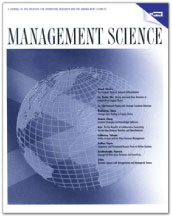Fuqua Faculty Scholarship: Andres Musalem
 Yina Lu, Andrés Musalem, Marcelo Olivares, Ariel Schilkrut, (2013) Measuring the Effect of Queues on Customer Purchases. Management Science 59(8):1743-1763.
Yina Lu, Andrés Musalem, Marcelo Olivares, Ariel Schilkrut, (2013) Measuring the Effect of Queues on Customer Purchases. Management Science 59(8):1743-1763.
Professor Andres Musalem of The Fuqua School’s Marketing faculty and his co-authors conducted an empirical study to analyze how waiting in lines (queues) at a retail store affects customers’ purchasing behavior.
Their study methodology combines a novel data set with periodic information about how lines are structured (collected via video recognition technology) with point-of-sales data. The authors found that waiting in line to make a purchase has a nonlinear impact on purchase incidence; and that customers appear to focus mostly on the length of the line, without adjusting enough for the speed at which the line moves.
Unlike prior research, which relied on surveys to measure both actual and perceived waiting times, this study uses actual field data to analyze the effect of lines on customer purchases. During a 7-month pilot study in 2008, Musalem and his co-authors used digital photos analyzed by image recognition software to track the number of people waiting, and the sales staff serving the customers at the deli of a large “supercenter” grocery chain store in a major metropolitan area in Latin America. They also collected point-of-sale data for all transactions involving relevant purchases from the beginning of 2008 until the end of the study period.
The research was further focused on grocery purchases of loyalty card customers who visited the store an average of one or more times per month. This accounted for a total of 284,709 transactions from 13,103 customers. Based on their analysis and findings from these data, the authors present and discuss three managerial insights. Pooling (combining) identical lines into a single queue served by multiple staff may result in lost sales. The benefits of adding servers when staffing queues is considered. Finally, the implications of external circumstances generated by congestion for pricing and promotion management in a product category are considered.
One of this paper’s significant contributions to queuing theory research is the development of this research methodology utilizing objective data rather than surveys after the fact. Because of their objective and empirically based methodology, the authors are confident in their conclusions regarding customer behaviors and the impacts of queue design on purchasing behavior. They also acknowledge that while their research focuses on the short term implications of lines during store visits, there are good opportunities for future applications of their method to study longer term effects of queues and customer service experience on future customer purchases.
The authors’ integration of advanced methods from both operations management and marketing have provided managers with an important and useful tool for decision-making regarding current operations, potential future operations, and the pricing and promotion of products.
Post content only © Carlton Brown & Ford Library, The Fuqua School of Business.